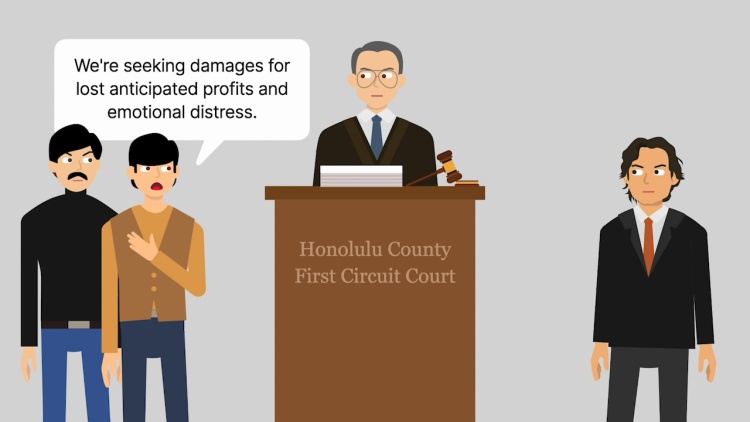Chung v. Kaonohi Center Co.
Hawaii Supreme Court
618 P.2d 283 (1980)

- Written by Sara Rhee, JD
Facts
On January 17, 1972, Farrant Chung, Jordon Y.S. Lum, and J & C Company (plaintiffs) negotiated to rent commercial space from Kaonohi Center Co. (Kaonohi) (defendant) for 10 years. The plaintiffs intended to take over a Chinese food outlet. Upon signing the lease, the plaintiffs secured financing, hired staff, and made preparations for the opening. Kaonohi knew of the plaintiffs’ preparations. Over the next year and a half, Kaonohi repeatedly assured the plaintiffs their opening date was forthcoming. The plaintiffs were unaware that Kaonohi had already granted a right of first refusal to a third party. Ultimately, Kaonohi rented the premises to another lessee and returned the plaintiffs’ deposit. The plaintiffs sued Kaonohi, seeking damages for emotional distress and lost profits. At trial, the plaintiffs’ expert witness used an income-stream analysis to estimate that the plaintiffs’ lost profits were approximately $225,000.00. The expert relied in part on the income of the Chinese kitchen already in business on the premises. The kitchen served the same type of food and clientele. The expert also relied on an estimate of expenses based on industry standards. Kaonohi contested the accuracy of these standards and presented contradictory evidence. The jury awarded the plaintiffs $50,000.00 for emotional distress and $175,000.00 for lost profits. Kaonohi moved for judgment notwithstanding the verdict or a new trial. The Circuit Court of the First Circuit denied the motion. Kaonohi appealed, arguing that emotional-distress damages were unavailable in the commercial context and lost profits could not be recovered by an unestablished business.
Rule of Law
Issue
Holding and Reasoning (Richardson, C.J.)
What to do next…
Here's why 907,000 law students have relied on our case briefs:
- Written by law professors and practitioners, not other law students. 47,100 briefs, keyed to 996 casebooks. Top-notch customer support.
- The right amount of information, includes the facts, issues, rule of law, holding and reasoning, and any concurrences and dissents.
- Access in your classes, works on your mobile and tablet. Massive library of related video lessons and high quality multiple-choice questions.
- Easy to use, uniform format for every case brief. Written in plain English, not in legalese. Our briefs summarize and simplify; they don’t just repeat the court’s language.





